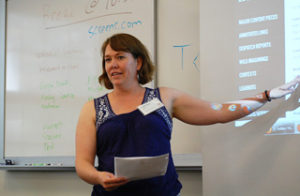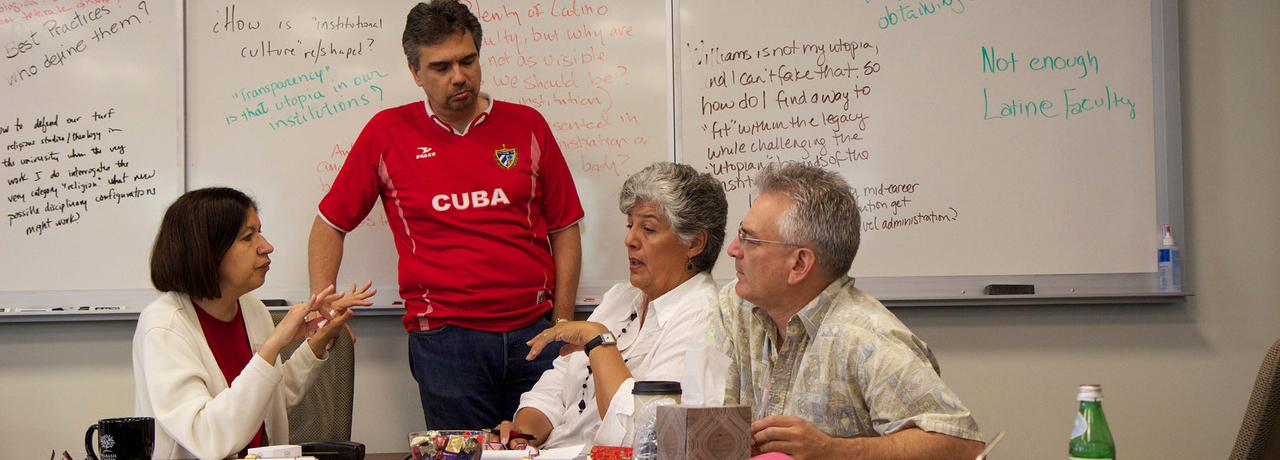Recommendations from Wabash Center Workshop Leaders
We asked several of the leaders of our teaching workshops and colloquies to recommend just one or two books, articles or websites that they would recommend as valuable resources for teachers. This short list provides a path into the vast field of the scholarship on teaching.
Rita Brock Nakashima et al., ed. Developing Teaching Materials and Instructional Strategies for Teaching Asian and Asian American/Canadian Women’s Theologies in North America, November 1999.
This report discusses issues facing Asian and Asian North American women as faculties and students, such as challenging the canon of knowledge, different learning and teaching styles, teaching against racism, and classroom dynamics. It is the only resource available on the subject.
John Palfrey and Urs Gasser, Born Digital: Understanding the First Generation of Digital Natives (Basic Books, 2008).
As digital immigrants, many faculties do not quite understand the culture of the generation who have grown up with instant messenger, mobile devices, MP3, and Facebook. Written by Internet and technology experts, this text helps us understand our students and children who live much of their lives online.
wabashcenter.wabash.edu/resources/detail?id=3638
Lucretia B. Yaghjian, Writing Theology Well: A Rhetoric for Theological and Biblical Writers (Continuum, 2006).
A resource to consult before constructing any writing assignment in a biblical studies, church history, or theology course. Yaghjian presents the contours of genres that are almost instinctual to faculty (but not to students) clearly. And she provides guidance for how to make them accessible to students. Using this book as a reference can result in better student work and fewer frustrating conversations about why a grade is what it is on a writing assignment.
Dannelle D. Stevens, et al, Introduction to Rubrics: An Assessment Toll to Save Grading Time, Convey Effective Feedback, and Promote Student Learning (Stylus, 2012).
Now in a revised edition, this remains perhaps the most accessible introduction to rubrics for college and university teachers. It explains rubrics in ways that make them useful to faculty in achieving their own aspirations to teach so that students learn well and still have time for scholarship and a life.
Sharon Daloz Parks, Leadership Can Be Taught: A Bold Approach for a Complex World (Harvard Business Review Press, 2005).
This is a close description and analysis of a master teacher at the Kennedy School at Harvard, Ron Heifetz. While Heifetz teaches leadership, not biblical studies, religious studies, or theology, both his approach to teaching and Parks’ analysis of it are provocative for thinking about the classroom and about how one might write about teaching.
Stephen Brookfield, Powerful Techniques for Teaching Adults (Jossey-Bass, 2013)
Stephen Brookfield’s entire corpus is a treasure to mine, but this most recent of his books distills the best of his theory, practice, and commitment to learning into a pragmatic resource you won’t want to put down. He engages the changing landscapes of learning with grounded, effective advice based on decades of experience. If you can only afford the time and funds to read one book — make it this one.
This remains one of the best essays for getting people to begin thinking about learner centered teaching. This would be especially valuable for new teachers and doctoral students post dissertation.
Stephen Moore and Yvonne Sherwood, The Invention of the Biblical Scholar (Fortress Press, 2011).
This book is more than a report of the field of biblical scholarship. It is one of the best texts in recent years for opening up questions about the status of teaching bible and training people who have interest in teaching the bible.
wabashcenter.wabash.edu/resources/detail?id=4592
Peter J. Elbow, “The Believing Game: A Challenge after Twenty-Five Years” in Everyone Can Write: Essays Towards a Hopeful Theory of Writing and Teaching Writing (Oxford University Press, 2000): 76-80.
Elbow’s attempt to balance the corrosive effects of a hermeneutic of suspicion with “the believing game” can help students discover what might have been compelling in practices, beliefs, or forms of community that are not their own. He writes lucidly and provides a provocative set of questions to be posed to students.
wabashcenter.wabash.edu/resources/detail?id=4204
See also:
Peter J. Elbow, “Methodological Doubting and Believing: Contraries in Inquiry” in Embracing Contraries: Explorations in Learning and Teaching (Oxford University Press, 1986): 254-304
Carol Trosset, “Obstacles to Open Discussion and Critical Thinking: The Grinnell College Study,” Change 30 (1998), 44-49.
Teachers who emphasize student engagement in various forms need also to understand what might inhibit student participation in class. Trosset’s essay is short and some of her findings are surprising.
Christopher I. Lehrich, On Teaching Religion: Essays by Jonathan Z. Smith (Oxford University Press, 2013).
Consistently provocative essays about the general contexts and purposes of teaching undergraduate students about religion.
Donald Finkel, Teaching With Your Mouth Shut (Boynton/Cook Publishers, 2000).
It is a resource because the kinds of schools that Finkel taught in are so different from my context. Yet, I have always known he is right about helping students to so see the class scaffolding that they can become the teachers, active learners, and the teacher can just be a presence, doing what ever is needed—silently directing or just being there to affirm.
StephenBrookfield.com
Stephen Brookfield’s webpage contains a wealth of information. He has links to articles, videos, PDF files for workshops, PowerPoint presentations. Other than the Wabash website, I think it has more stuff to mine than any other site.
Nancy Lynne Westfield, ed. Being Black Teaching Black: Politics and Pedagogy in Religious Studies (Abingdon Press, 2008).
This book, with its host of contemporary black voices, is a resource for understanding what happens when a black person—or really, any person of color—enters the religious studies classroom.
Mathew L. Ouellett, ed., Teaching Inclusively: Resources for Course, Department & Institutional Change in Higher Education (New Forums, 2005).
This book contains numerous case studies of what schools have actually tried and done to make their respective curriculum and classroom practice more diverse and inclusive. An added bonus is the last chapter where you can find a list of online resources on the topic.
Stephen D. Brookfield, Discussion as a Way of Teaching: Tools and Techniques for Democratic Classrooms (John Wiley & Sons, 2005).
If it is true that students learn more and better through constructivist and active learning (and I believe it is), this is an indispensable book for a teacher to think through how and what kind of discussion would be efficient and effective.
Jane Vella, Taking Learning to Task: Creative Strategies for Teaching Adults (Jossey-Bass, 2000).
Shifts the emphasis of teaching away from content delivery to learning tasks: open questions that lead to open dialogue between instructor and learners. Reading this book completely revolutionized how I construct in-class small-group discussions, which now facilitate more effective student learning, are more engaging for students in the groups, and produce better plenary discussions afterwards.
Grant Wiggins and Jay McTighe, Understanding by Design (Association for Supervision and Curriculum Development, 1998).
This book provides an essential paradigm for course design by focusing on “backward design:” first identify the desired results of a course, then determine what will count as evidence of these results, and then finally design the learning experiences, assessment tools (assignments), and instruction for the modules of the course.

Latest Blog Posts
 Embracing the Imposter Within - “What are you working on these days?” the President asked. The setting was a professional meeting. I was on the Board of Directors of my professional society, and I was […]
Embracing the Imposter Within - “What are you working on these days?” the President asked. The setting was a professional meeting. I was on the Board of Directors of my professional society, and I was […] Plagiarism as Gaslighting in the Time of Artificial Intelligence - In one of my teaching documents I claim that good professors motivate, prepare, and support their students to produce good work in their courses. I remain deeply committed to this […]
Plagiarism as Gaslighting in the Time of Artificial Intelligence - In one of my teaching documents I claim that good professors motivate, prepare, and support their students to produce good work in their courses. I remain deeply committed to this […]

Reflective Teaching
The Wabash Center’s Online Publication Reflective Teaching publishes short (500 word) reviews of books and resources about teaching and learning.